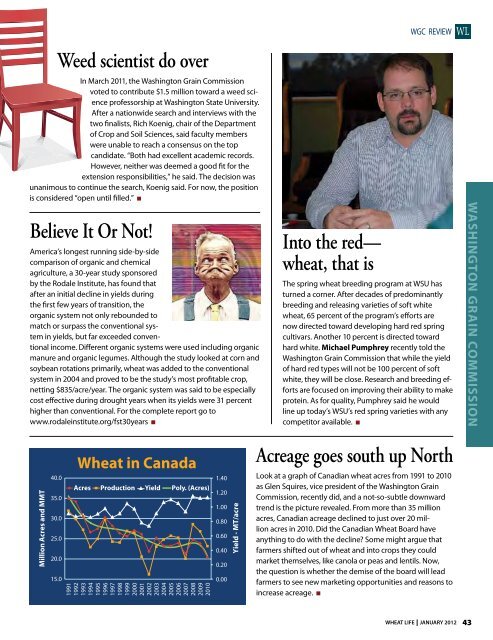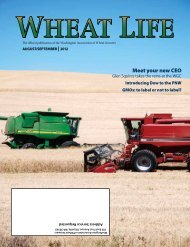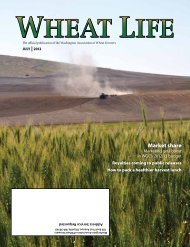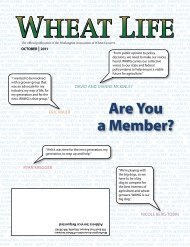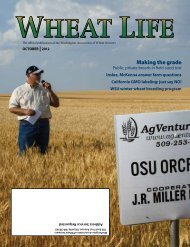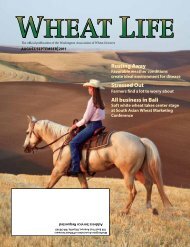Download - Wheat Life
Download - Wheat Life
Download - Wheat Life
Create successful ePaper yourself
Turn your PDF publications into a flip-book with our unique Google optimized e-Paper software.
WGC REVIEW WL<br />
Weed scientist do over<br />
In March 2011, the Washington Grain Commission<br />
voted to contribute $1.5 million toward a weed science<br />
professorship at Washington State University.<br />
After a nationwide search and interviews with the<br />
two finalists, Rich Koenig, chair of the Department<br />
of Crop and Soil Sciences, said faculty members<br />
were unable to reach a consensus on the top<br />
candidate. “Both had excellent academic records.<br />
However, neither was deemed a good fit for the<br />
extension responsibilities,” he said. The decision was<br />
unanimous to continue the search, Koenig said. For now, the position<br />
is considered “open until filled.”<br />
Believe It Or Not!<br />
America’s longest running side-by-side<br />
comparison of organic and chemical<br />
agriculture, a 30-year study sponsored<br />
by the Rodale Institute, has found that<br />
after an initial decline in yields during<br />
the first few years of transition, the<br />
organic system not only rebounded to<br />
match or surpass the conventional system<br />
in yields, but far exceeded conventional<br />
income. Different organic systems were used including organic<br />
manure and organic legumes. Although the study looked at corn and<br />
soybean rotations primarily, wheat was added to the conventional<br />
system in 2004 and proved to be the study’s most profitable crop,<br />
netting $835/acre/year. The organic system was said to be especially<br />
cost effective during drought years when its yields were 31 percent<br />
higher than conventional. For the complete report go to<br />
www.rodaleinstitute.org/fst30years<br />
Into the red—<br />
wheat, that is<br />
The spring wheat breeding program at WSU has<br />
turned a corner. After decades of predominantly<br />
breeding and releasing varieties of soft white<br />
wheat, 65 percent of the program’s efforts are<br />
now directed toward developing hard red spring<br />
cultivars. Another 10 percent is directed toward<br />
hard white. Michael Pumphrey recently told the<br />
Washington Grain Commission that while the yield<br />
of hard red types will not be 100 percent of soft<br />
white, they will be close. Research and breeding efforts<br />
are focused on improving their ability to make<br />
protein. As for quality, Pumphrey said he would<br />
line up today’s WSU’s red spring varieties with any<br />
competitor available.<br />
WASHINGTON GRAIN COMMISSION<br />
Million Acres and MMT<br />
40.0<br />
35.0<br />
30.0<br />
25.0<br />
20.0<br />
15.0<br />
<strong>Wheat</strong> in Canada<br />
Acres Production Yield Poly. (Acres)<br />
1991<br />
1992<br />
1993<br />
1994<br />
1995<br />
1996<br />
1997<br />
1998<br />
1999<br />
2000<br />
2001<br />
2002<br />
2003<br />
2004<br />
2005<br />
2006<br />
2007<br />
2008<br />
2009<br />
2010<br />
1.40<br />
1.20<br />
1.00<br />
0.80<br />
0.60<br />
0.40<br />
0.20<br />
0.00<br />
Yield - MT/acre<br />
Acreage goes south up North<br />
Look at a graph of Canadian wheat acres from 1991 to 2010<br />
as Glen Squires, vice president of the Washington Grain<br />
Commission, recently did, and a not-so-subtle downward<br />
trend is the picture revealed. From more than 35 million<br />
acres, Canadian acreage declined to just over 20 million<br />
acres in 2010. Did the Canadian <strong>Wheat</strong> Board have<br />
anything to do with the decline Some might argue that<br />
farmers shifted out of wheat and into crops they could<br />
market themselves, like canola or peas and lentils. Now,<br />
the question is whether the demise of the board will lead<br />
farmers to see new marketing opportunities and reasons to<br />
increase acreage.<br />
WHEAT LIFE JANUARY 2012 43


